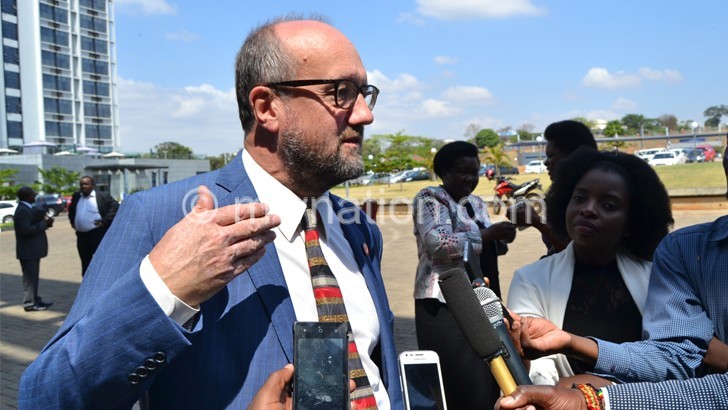Graft fight on deathbed
- ACB funding drops 12% since 2014
- As government dithers on crucial reforms
The fight against corruption is on its death bed as Capital Hill either cuts funding to key institutions or dithers to activate tools designed to strengthen the bodies.
Weekend Nation’s analysis of funding to key institutions in the graft fight since 2014, and a review of their legal and regulatory state, show a slack in support to the bodies.

The leading institutions we have analysed include Anti-Corruption Bureau (ACB), Director of Public Prosecutions (DPP), Financial Intelligence Authority (FIA), National Audit Office (NAO), Public Procurement and Disposal of Assets Authority (PPDA) and Treasury.
Among these institutions, ACB is the worst hit on funding, with our analysis showing a 12 percent cut in nominal terms since the 2014/15 fiscal year.
The Bureau’s funding has crashed to K938 million this fiscal year, from a five-year high of K2.4 billion in 2016/17, figures from government’s financial statements show.
The Bureau’s funding rose from K1.4 billion in 2014/15 to K1.8 billion the following fiscal year; climbed to K2.4 billion a year later, then slid to K1.8 billion in the just-ended financial year, before fizzling to the K938 million current allocation.
While other institutions in the graft fight appear to have received improved funding, albeit in a see-saw fashion since 2014, budget documents show that FIA and DPP have received lower allocations in the current financial year.
For those that have enjoyed consistently high allocations, such as PPDA and NAO, it is the lack of political will to implement changes to improve their effectiveness that is hurting them alongside those suffering funding squeeze.
The Peter Mutharika administration has tiptoed around crucial changes, including dithering on buying and securing an upgraded government accounting system—the Integrated Financial Management System (Ifmis)—whose breach was the genesis of Cashgate.
To date, Capital Hill has not changed Ifmis, five years after the costly plunder as procurement ineptitude festers.
Treasury spokesperson Davis Sado said, in a written response to a questionnaire, that legal problems—following one of the bidders’ move to challenge the procurement process—has led to the delay to buy Ifmis.
He said: “The delay was not the making of government or any of its agents, but it should be mentioned that after demonstrations by the selected successful bidders who passed the technical evaluation, there was a legal challenge from one of the bidders, a matter which stakeholders in this procurement are aware of as they were being updated on each and every step of the procurement process.
“Therefore, government had to deal with the matter as provided by the law. As a Ministry [of Finance, Economic Planning and Development] we shall soon issue a statement detailing all matters surrounding the whole process and where we are for the attention of all stakeholders and the general public.”
Meanwhile, government continues to use the old Ifmis version that is not technically backed by the supplier—Epicor Corporation—because the company stopped providing support to the old software.
This has left the system still vulnerable to abuse—the same weakness that bred Cashgate and cost the taxpayer up to K236 billion in the five years leading to December 2014.
Due to age, there is also the problem of poor performance of the system in general.
But legal problems aside, a highly placed source told Weekend Nation that the buying of Ifmis has delayed largely because the main financial backer, the World Bank, pulled out of the new software project because some individuals interfered with procurement procedures.

World Bank country manager Greg Toulmin—while not confirming that the bank abandoned the project due to the said procurement interferences—explained that initially, his organisation and other development partners had planned to contribute to the procurement of Ifmis under the Financial Reporting and Oversight Improvement Project (FROIP), but had to pullout.
He said after discussions on various procurement options between the Bank and Government, it was mutually agreed that FROIP would not finance the procurement, and that government could procure the system through its own resources and systems.
Government has also failed to operationalise some Acts of Parliament that govern financial rules and regulations as well as those that promote transparency and accountability.
These include the Public Procurement Act, the Public Audit Act and the Access to Information Act. Capital Hill has also allowed reforms to the Corrupt Practices Act to gather dust.
Despite enacting the Public Procurement and Disposal of Assets (PPDA) that has key reforms to help fight graft through procurement—the largest source of pilferage of government funds as confirmed by both Baker Tilly and PricewaterhouseCoopers (PwC) forensic audits into Cashgate—government is yet to develop regulations to make the law effective although procurement authorities claim the old regulations are still effective.
PPDA assistant director for regulatory and review Timothy Kalembo said under Section 66 of the Act, the law provides for transitional mechanisms.
“Therefore, this transitional provision, in essence, allows for continuity. In light of this, it cannot, therefore, be said that the PPDA is implementing the Act without regulations.
“When Section 66 is read together with Section 65, so long as the earlier provisions are not inconsistent with the provisions of the new Act, the earlier regulations will continue to be in force. So, PPDA can still implement the new Act through the older regulations, so long as the older regulations are not in conflict with the provisions of the new Act,” he said.
The Mutharika administration has also been sitting on the operationalisation of the Public Audit Act which, among other things, dictates that the President should not appoint the Auditor General, but rather a panel of experts to ensure independence of the office.
The administration has also dithered on the amendment to the Corrupt Practices Act that would, among other things, ensure the independence of the ACB, including stopping the President from appointing the director general and deputy director General.
ACB senior public relations officer Egrita Ndala said the ACB sent the proposed amendments to the Ministry of Justice and Constitutional Affairs.
“You may wish to find out from the Ministry on the progress. The proposed areas were many, one of which was the appointment of director general and deputy director general,” she said.
On ATI, Minister of Information Nicholas Dausi said the tripartite committee that was set up to look at the operationalisation of Access to Information was looking at the final modalities of operations of the Act.
However, a highly placed sourced indicated that the Act’s operationalisation has stalled due to lack of funding.
“The Human Rights Committee was to employ information officers. There is no budget for the exercise,” said the source.
These are some of the government neglects that analysts say is fueling corruption and fraud in the country as weak anti-corruption institutional measures handicap key institutions in the graft fight.
“While the current institutional design raises public expectations, little progress has been made to reduce corruption. That is, the incentive to institute anti-corruption measures has been accompanied by underlying incentives to keep those measures weak so as to perpetuate corruption.
“For example, let us look at the Access to Information Law; government through its line Ministry drafts the Bill, the line Ministry writes a Cabinet paper and sends the Bill to Cabinet for Debate and input; when the Cabinet is satisfied, the Minister responsible brings the Bill to Parliament; Parliament debates and enacts the Bill into Law; the Clerk of Parliament sends the legislation to the President to assent; and the last mediocre thing is after all these processes is that the Minister responsible should appoint the date when that law can take force. What the hell is this? Does that really make sense that a law which the elected an Parliament has enacted and an elected President has assented to could be stonewalled by a Minister?” he wondered.
Systems don’t steal, people do
Malembo said the challenge in fighting corruption in Malawi is that Malawians celebrate corrupt elites.
“Malawians know that when people indulge in corrupt practices there are no risks attached. There are mob justices against petty thieves who still chickens and empty plastics bottles while fatty thieves masquerading as politicians are celebrated.
“The illusion of being a peaceful nation plus a combination of poverty and docility will keep this country under bottom three of the poorest forever. There is an overdose of mediocrity in this country. This country needs a revolution,” he said.
World Bank’s Toulmin said while the technology in the form of Ifmis is an important tool for helping to reduce the abuse of public funds, the technology on its own cannot address human elements that affect effective administration.
“These include such issues as behavioural attitudes, incentives for managerial accountability and staff performance at all levels. In addition, several development partners are considering how they can help to improve the performance of the current Ifmis, pending a longer term solution,” he observed.
He said corruption continues to be one of the major obstacles blocking Malawi’s road to prosperity and that the World Bank will continue to emphasise the need to address corruption both in relation to the funds they administer, and to government funds.
“Cashgate further exposed the reality of the pervasiveness of corruption in Malawi and rightfully increased stakeholder demand for much greater scrutiny in the management of public resources. However, real and substantial progress towards eliminating corruption requires more resolute political and civil will to build on current efforts to address this challenge,” said Toulmin.
Sado also made the same observation, that corruption in Malawi was a people issue bordering on morality and work ethnics, and not linked to the system.
“As Malawians, let us all avoid corruption because it is an evil which derails government’s efforts of developing the country. Over the years, the system has been upgraded to seal some of the identified loopholes as pointed out by the Baker Tilly Report.”
Meanwhile, corruption perceptions worsen as government cuts funding to crucial bodies and dawdles on major instruments to help improve the situation.
Malawi scored 31 points out of 100 on the 2017 Corruption Perceptions Index as reported by Transparency International.
But President Mutharika claims his government was winning the fight against corruption and blamed politicians and media of writing negative stories that affect the country’s international perception.
The President has also issued strong statements against officials who break the law, especially on procurement.
During the opening of the 2018/19 budget session of Parliament, Mutharika warned controlling officers that his government would hold accountable those who fail to undertake their responsibilities as laid down in important legal frameworks.





